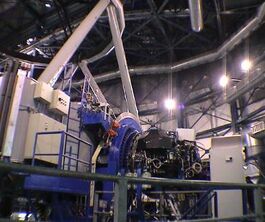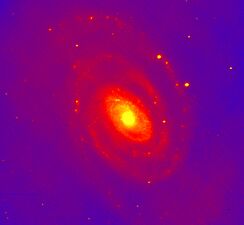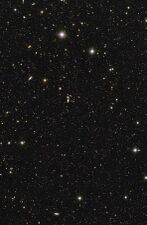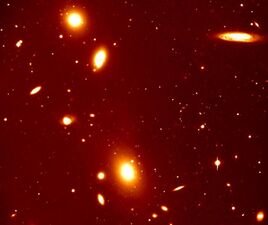Engineering:Visible Multi Object Spectrograph

The Visible Multi-Object Spectrograph (VIMOS) is a wide field imager and a multi-object spectrograph installed at the European Southern Observatory's Very Large Telescope (VLT), in Chile. The instrument used for deep astronomical surveys delivers visible images and spectra of up to 1,000 galaxies at a time.[1][2] VIMOS images four rectangular areas of the sky, 7 by 8 arcminutes each, with gaps of 2 arcminutes between them.[1] Its principal investigator was Olivier Le Fèvre.
The Franco-Italian instrument operates in the visible part of the spectrum from 360 to 1000 nanometers (nm). In the conceptual design phase, the multi-object spectrograph then called VIRMOS included an additional instrument, NIMOS, operating in the near-infrared spectrum of 1100–1800 nm.[3]
Operating in the three different observation modes, direct imaging, multi-slit spectroscopy, and integral field spectroscopy, the main objective of the instrument is to study the early universe through massive redshift surveys, such as the VIMOS-VLT Deep Survey.[4]
VIMOS saw its first light on 26 February 2002, and has since been mounted on the Nasmyth B focus of VLT's Melipal unit telescope (UT3).[5][6]
It was retired in 2018 to make space for the return of CRIRES+.[7]
Gallery
-
Galaxy NGC 7424 seen by VIMOS
-
VIMOS takes its first light image of galaxy NGC 5364
-
A triplet of galaxies seen by VIMOS
-
The Antennae Galaxies, one of VIMOS' first images
-
VIMOS images the 500 million light years distant galaxy cluster ACO 3341
-
Galaxy NGC 2613, a spiral galaxy that resembles our own Milky Way
-
VIMOS sees cluster NGC 6118 at a distance of 80 million light-years
-
Messier 100 seen in different filters by VIMOS (left) and FORS 1. (Note supernova SN 2006X in the middle of the right image, just above the lower main spiral arm).
-
Close-up of VIMOS
See also
- List of instruments at the Very Large Telescope
References
- ↑ 1.0 1.1 "VIMOS – Visible Multi Object Spectrograph (Summary)". ESO. 19 December 2013. https://www.eso.org/sci/facilities/paranal/instruments/vimos.html.
- ↑ "VIMOS – General Description (Overview)". ESO. 23 March 2013. https://www.eso.org/sci/facilities/paranal/instruments/vimos/overview.html.
- ↑ "VIMOS and NIRMOS: Status Report" (PDF). ESO. March 1998. https://www.eso.org/sci/publications/messenger/archive/no.91-mar98/messenger-no91-16-17.pdf.
- ↑ "New Light on Dark Energy—Probing the cosmic Web of the Universe". ESO. 30 January 2008. https://www.eso.org/public/unitedkingdom/news/eso0804/.
- ↑ "VIMOS—Visible Multi-Object Spectrograph". ESO. https://www.eso.org/public/unitedkingdom/teles-instr/vlt/vlt-instr/vimos/.
- ↑ "VIMOS—a Cosmology Machine for the VLT. Successful Test Observations With Powerful New Instrument at Paranal". ESO. 13 March 2002. https://www.eso.org/public/unitedkingdom/news/eso0209/.
- ↑ "Paranal – decommissioned instruments". https://www.eso.org/sci/facilities/paranal/decommissioned.html.
- ↑ Largest Galaxy Proto-Supercluster Found - Astronomers using ESO's Very Large Telescope uncover a cosmic titan lurking in the early Universe, European Southern Observatory (ESO), 17 October 2018, Science Release eso1833, https://www.eso.org/public/news/eso1833, retrieved 19 October 2018
 |









![Visualization of the Hyperion proto-supercluster found within COSMOS seen by VIMOS.[8]](/wiki/images/thumb/c/c7/The_Hyperion_Proto-Supercluster.jpg/400px-The_Hyperion_Proto-Supercluster.jpg)

